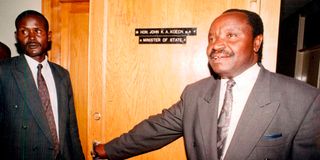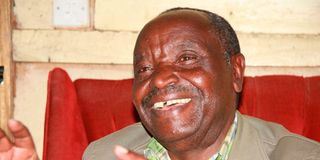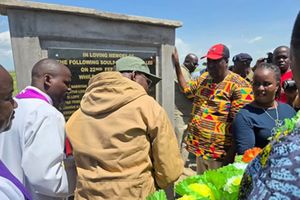
August 1, 1997: A Minister of State in the Office of the President, Mr. John Koech (right), announces that he had resigned from the Cabinet with immediate effect. Mr. Koech, who was accompanied by a bodyguard, entered the Nakuru Nation bureau just before 5 pm and asked to be shown to the person in charge.
On the afternoon of August 1, 1997, the Minister for the Office of the President John Kipsang Koech walked into the Nation Media Group’s Nakuru Bureau offices at CK Patel building, a decision that would forever change the trajectory of his political career.
Dressed sharply in a suit and tie, the Chepalungu MP, who died on Tuesday April 8 after a long illness, asked for the man in charge.
Veteran journalist Michael Njuguna, who was the bureau chief, was startled when the visibly angry minister sat before him and without wasting time, announced his resignation from President Daniel arap Moi’s Cabinet.
“The minister entered the office, asked the secretary to be shown the man in charge and he was directed to my desk. He was fuming with anger and he told me he had resigned in Moi's cabinet with immediate effect. Without so much ado, he requested for a piece of paper and I handed him a foolscap,” Mr Njuguna recalled in an interview.
“I have resigned as your minister,” Koech scribbled hastily on the piece of foolscap, signed it and handed it to Njuguna.
“I shall give a comprehensive statement on Monday (August 4, 1997)… signed Hon John Arap Koech Minister of State OP,” the letter read, as he stormed out of the office.
Mr Koech signed the letter, indicated the time as (4:45 pm) at the top of the letter, then walked out of the newsroom with a bodyguard in tow, as Mr Njuguna processed and filed his story.

John Kipsang Koech, a former Cabinet Minister.
Mr Njuguna read Koech's decision was bold, unprecedented and a statement of his integrity, a culmination of months of frustration with a system that he felt no longer valued his contribution.
The backdrop to this event was a public snub that Koech had endured at Egerton University’s graduation ceremony in Njoro, Nakuru County, where he was deliberately placed far from President Moi while his perceived successor Kipkalya Kones sat close to the Head of State.
Koech’s fury boiled over when he was not allowed entry to Moi’s private residence in Kabarak as other MPs, including Kones and Konoin MP Nathaniel Chebelion, were welcomed in.
Having seen the writing on the wall, Koech knew it was only a matter of time before he was dismissed from the Cabinet, a fate that befell many ministers in the Moi administration and was typically announced during the one o’clock or seven o’clock news bulletins on KBC.
Rather than wait for the inevitable, Mr Koech who died on Tuesday at the age of 79 took control of his destiny.
His resignation was an act of defiance, one that not only shocked the government but also sent a clear message about his unwillingness to bend to a system that he believed had lost its way.
But according to Mr Njuguna, the drama of that afternoon did not end with Koech’s resignation.
Just moments after the minister left the Nation offices, the Rift Valley Provincial Commissioner Yusuf Haji arrived to confirm that the resignation was genuine.
“Shortly after we had filed our story to Nairobi, Haji strode into the office seeking confirmation that the Minister had indeed resigned,” revealed Mr Njuguna.
As news of the resignation spread, the security apparatus went into overdrive trying to track down the former minister who had switched off his phone and driven off to Nairobi.
He was tracked to his home in Nairobi and summoned to Kabarak the following day for a meeting with President Moi.

Late President Daniel arap Moi.
It was during this meeting that Koech reportedly retracted his resignation.
Yet, by this point, he had already become a marked man within the Moi administration.
In a recent interview with this writer, Koech revealed that he had long been disillusioned with the way things were going in the government.
“It had been going on for some time and I could not stomach anymore. I was annoyed and frustrated that I was being sabotaged by people in the corridors of power. It got to a point that I said to myself that I would not wait to be sacked. I chose to leave on my own rather than wait for the news to be broken through the KBC news bulletin,” he said at his Bomet office.
Born in Segemik, Olbutyo, Bomet County in 1946, Koech was a man of principle.
His academic journey took him from local primary schools (1955-1962) to Tenwek High School for his “O” and “A” level education (1963-1972) then to Makerere University in Uganda where he earned a degree in Economics.
Upon returning to Kenya, he served as a high school teacher (1973-1974) when he resigned to make a stab in politics seeking to be elected as Chepalungu MP but lost forcing him to return to his job as a teacher before being promoted as education officer in Nyeri.
His political career began in earnest in 1979 when he was elected as the Member of Parliament for Chepalungu after defeating Kimunai Soi.
He was later fired from the Cabinet for allegedly being close to former Vice President Mwai Kibaki (a fellow economist and Makerere University alumni), the Democratic Party (DP) leader who later became President, and as fate would have it, appointed Mr Koech a Cabinet Minister.
Koech’s resignation in 1997 however marked a significant turning point in his career.
His political relationship with President Moi had been on shaky ground for some time and he had grown frustrated with the political games being played around him.
Despite the turmoil of his resignation, Koech’s political career was far from over.
Unep appointment
After losing his seat in the 1997 elections to Isaac Ruto, Koech was appointed as Kenya’s Permanent Representative to the United Nations Environmental Programme (Unep).
When he bounced back as MP in the 2002 general election, he was appointed by former President Kibaki as the Minister for East African Community.
His diplomatic career saw him playing an instrumental role in regional peace processes particularly in Sudan and Somalia where he worked tirelessly to foster peace and stability in East Africa.
Drawing a parallel with President Moi and President Kibaki’s administrations, in a previous interview with this writer, Mr Koech stated that in his tenure, the third President of Kenya (Kibaki) did not interfere with the running of government ministries.
“When I served as the chairman of the East African Community Council of ministers, President Kibaki played a leading role in ensuring that the existing hurdles were cleared for Burundi and Rwanda to be accommodated under the regional bloc for purposes of integration of communities and building a strong regional economy,” said Mr Koech.
Koech’s most notable achievement on the international stage was his involvement in the peace negotiations that led to the independence of South Sudan.
However, despite his diplomatic successes, Koech’s political career was far from smooth.
He was dealt a major blow in the 2007 elections where he was once again defeated by Isaac Ruto, who had become a key political figure in the region. He had also defected to the Orange Democratic Movement.
“I am defecting to ODM because there is no government in place since the President (Kibaki) has joined a party (PNU) unknown to Kenyans and without agenda. My main reason for not supporting President Kibaki – who is a good man- and very helpful – is that people close to him do not understand the plight of many Kenyans as they secured plum jobs and financial power in a government they did not fight to bring to power. The entire government is in the opposition,”he said when he drove to ODM offices without a ministerial flag where he was received by Mr Raila Odinga.
Fellow Health Minister Charity Ngilu had also resigned from the Cabinet.
Mr Joseph Sanga, a Kanu official in Chepalungu, says Mr Koech did not use his political office to accumulate wealth, unlike many of his contemporaries in the Kanu government.
“The late Koech is known as an incorruptible leader who sought to improve the standards of living for the people he led and believed in empowering them above himself,” says Mr Sanga.
Former Bomet Governor Isaac Ruto who succeeded Koech as the MP for Chepalungu described him as an icon of good leadership.
“He was an accomplished public servant who will be greatly missed,” Mr Ruto said.
Chepalungu MP Victor Koech also paid tribute to the late leader, stating that the constituency had lost “a father and a leader who is remembered for championing the improvement of the socio-economic set up and well-being of the people he led.”
President William Ruto in his condolences message noted that Koech was a “focused, progressive, and development-conscious leader” who made significant contributions to the country’s development.







